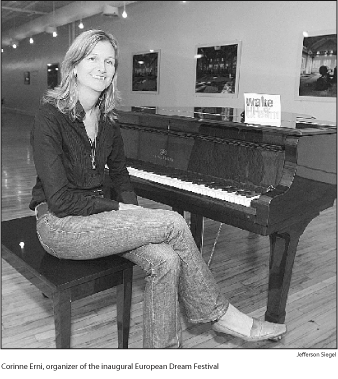By Nicole Davis
This week, an army of dancers, actors, musicians, writers and filmmakers from 23 European countries will descend upon performance venues around New York for the first annual European Dream Festival. Dreamed up by the former director of the Goethe-Institut and funded by the EU, the six-week-long festival was organized by Corinne Erni, a Swiss-born New Yorker who already has one cross-Atlantic performance festival, Swiss Peaks, under her belt. She spoke to The Villager about the pending onslaught of overseas talent, European culture in flux, and the highlights of the festival’s 40 shows.
Lots of European performance groups come through New York. Why organize an entire festival for them?
I know a lot of these acts come to New York anyway, but this has a completely different impact. It’s sort of designed to give New York audiences a walk through Europe, so you get an image of a whole—as opposed to seeing this one dance group from France. And I don’t think Europe has been presented to an American audience in such complexity since the EU formed. It’s really unique to have 23 counties in New York presented as Europeans.
It seems as if Europe is going through an identity crisis.
Yeah, they have to really find themselves culturally. They’re faced with so many different realities now that they’re unified. It’s so different from American identity because there are so many groups in America. In Europe you have nations, and so many languages and dialects—it’s very complex. And I think that’s what the EU wants to show—that it is a unified entity even though there is a lot of fragmentation and diversity. If you think about it, only 60 years ago these countries were at war and now they have one currency. This is quite amazing. By opening up the borders, you can travel with just an ID card and before it was more difficult. I remember growing up, we had no idea what was going on in Czechoslovakia and Hungary. We grew up just knowing one part [of Europe]—there was the wall and it hasn’t been too long since it was torn down.
So how does that play out today in the European Union?
I think you still have the stereotype of the disciplined German, the happy-go-lucky Italian, but they would probably all wear Nike sneakers or listen to hip-hop. This is what shocks me when I got to Europe now—I feel like everyone is dressed the same way. Another big issue is the second generations of immigrants…growing up with conflicting values — those of their parents and liberal Europe — while being faced with massive unemployment. This creates huge tensions, as we have seen in the Paris riots, the London bombings, the Danish caricature riots, the murders in the Netherlands of critics of Muslim culture… So these young people are struggling to find their own identity, while at the same time mass culture gives youth an identity worldwide.
Some of these issues are represented in the festival…
Yes. In Dreaming.Anderson, [a play about Hans Christian Anderson, performed by a Czech company], they have hip-hop artists and graffiti artists as well as traditional, Czech puppetry. A lot of the films will deal with that issue, too, of displacement and identity. And “Tower of Babel” definitely deals with that—there you have storytellers from around the world who tell stories in their native language. That should be an interesting production; it’s almost like a musical experience to hear all those languages.
Were any of the countries represented in the festival difficult to work with?
Yes, but I wouldn’t tell you which ones. I wouldn’t want to create more trouble.
Most of the festival seems very contemporary and cutting edge — there’s lots of multi-media performance, but the music on the whole seems very traditional. Any reason why that is?
In Europe there’s a lot more support for dance and theater, so they have more money to invest in all this [multi-media] equipment and to experiment with all of that. On the other hand, in terms of music, a lot of the musicians in Europe base their music on tradition, and so we have a lot of acts based on jazz, folk, and classical music, but taken to a modern level.
What shows are you looking forward to?
I’m excited about the German performance, “Back to the Present.” I think that’s going to be wild. And “À Bras le Corps” — a dance by two male choreographers—should be very intense. And also the gypsy dance ensemble. And the Scandinavian jazz — it’s not the first thing you think of when you think of Scandinavia…
For more information on the festival, visit www.europeandream.us



































